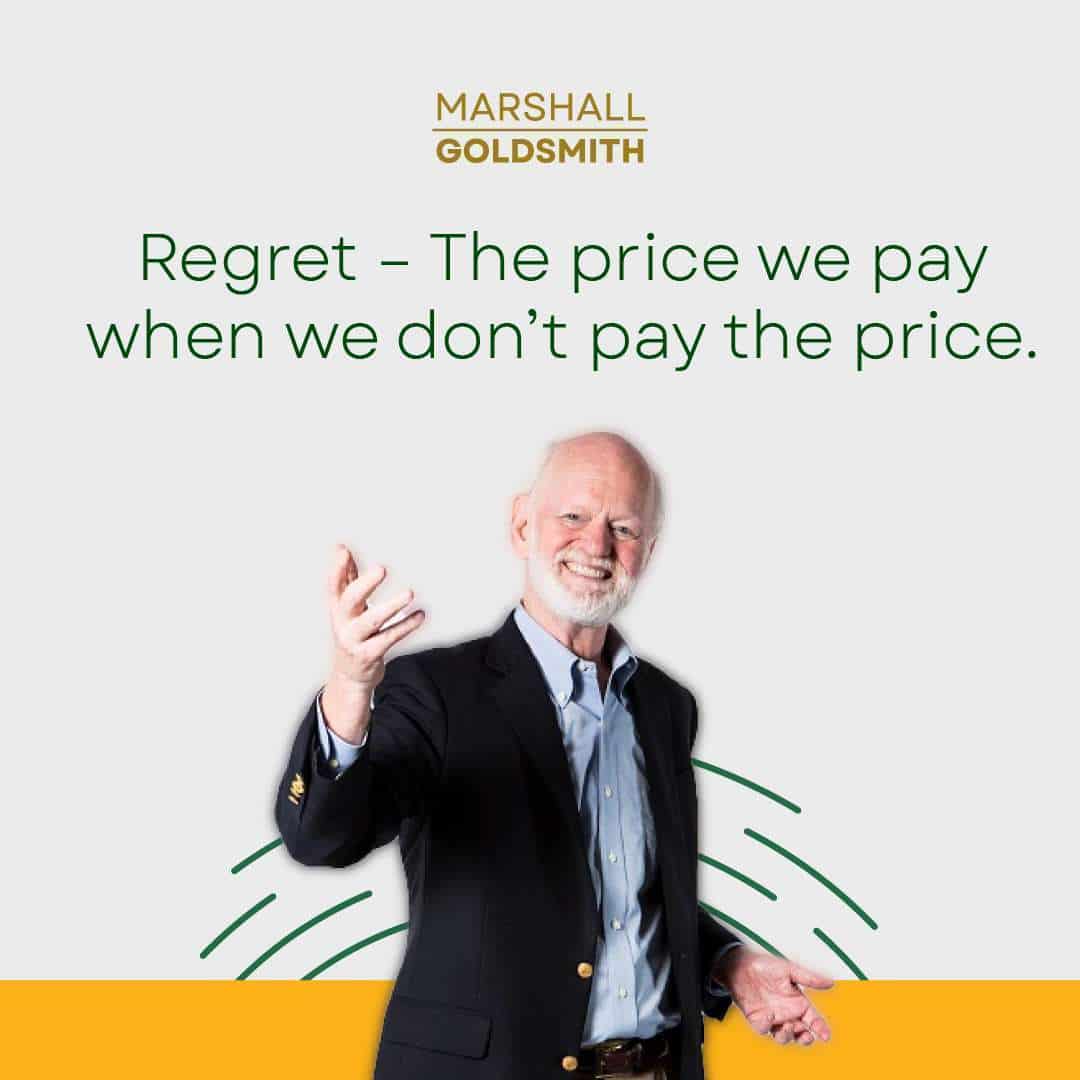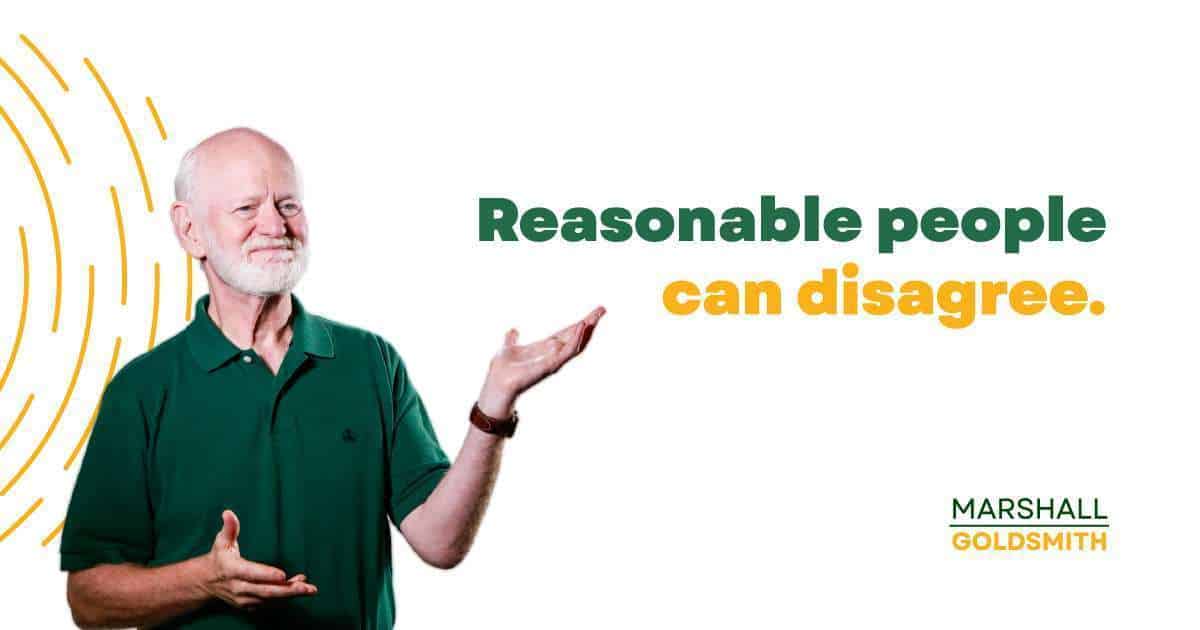Playing Favorites By Marshall Goldsmith There’s a reason I devote...
Why do we set New Year’s resolutions that seldom last through January, much less for the entire year? Think about the ones you set for yourself. Have you made any progress? What goes wrong – over and over again?
Most New Year’s resolutions are health-related, and my expertise is in helping successful people change their relationship behavior. Yet many of the roadblocks that prevent us from getting to the gym often are the same ones that thwart us in achieving any goal.
Five of the most common reasons for giving up on our goals are listed below. Understanding these roadblocks will help you apply some preventive medicine – and increase the odds that you won’t fall into the same old traps.
Ownership
I wasn’t sure that this would work in the first place. I tried it out – it didn’t do that much good. As I guessed, this was kind of a waste of time!

The classic mistake made in leadership development, coaching, and self-help books is the promise that “This will make you better!” After years of experience in helping real leaders change real behavior in the real world, I have learned a hard lesson. Only you will make you better! For example, almost any type of workout scheme will provide benefit, if you do it. The ultimate driver for change has to come from inside you – not from the program, book, or coach.
Never begin a change program with the thought “This sounds like an interesting plan. I will just try it out and see if it works.” If that’s your thinking, it won’t work.
To have a real chance of success, you have to take personal ownership and have the internal belief that “This will work if, and only if, I make it work. I am going to make this work.”
Time
I had no idea that this process would take so long. I’m not sure it’s worth it.
Goal setters have a chronic tendency to underestimate the time needed to reach targets. Everything seems to take longer than we think it should. When the time elapsed in working toward our goal starts exceeding expectations, we’re tempted to just give up on the goal.
In setting our goals for behavioral change, it’s important to be realistic about the time we need to produce positive, lasting results. Habits that have taken years to develop won’t go away in a week. Set time expectations that are 50% to 100% longer than you think you will need to see results – then add a little more!
Difficulty
This is a lot harder than I thought it would be. It sounded so simple when we were starting out.
The optimism bias of goal setters applies to difficulty as well as time. Not only does everything take longer than we think it will, it requires more hard work. We all confuse two terms that appear to be synonymous but are actually quite different: simple and easy. We want to believe that once we understand a simple concept, it will be easy to execute a plan and achieve results.
If this were true, everyone who understood that they should eat a healthy diet and exercise regularly would be in shape. As sales of diet books have increased, Americans keep gaining weight. Our challenge for getting in shape as well as for changing leadership behavior lies not in the understanding but in the doing! Understanding is easy. Doing is tough.
In setting goals, it’s important to accept the fact that real change requires real work. Making yourself feel good in the short term with statements like “This will be easy” and “This will be no problem for me” can backfire in the long term, when you realize that change isn’t easy and that you will invariably face hard challenges in your journey toward improvement. Acknowledging the price for success in the beginning of the change process will help prevent the disappointment that can occur when challenges arise later.
Distractions
I would really like to work toward my goal, but I’m facing some unique challenges right now. It might be better if I just stopped and did this at a time when things weren’t so crazy.
Goal setters have a tendency to underestimate the distractions and competing goals that will invariably appear throughout the year. A piece of advice that I give all of my coaching clients is: “I’m not sure what crisis will appear, but I’m almost positive that some crisis will appear!”
The distraction or crisis may result from a problem, where in other cases it may result from an opportunity. Setbacks let us think, “I just have to take care of this problem first,” while opportunities give us the handy excuse “I may never have this chance again.” Either can be deadly in stopping us from achieving preset goals.
Plan for distractions in advance. Assume that crazy is the new normal. You will probably be close to the reality that awaits!

Maintenance
I think that I did actually try to change and get better, but I have let it slide since then. What am I supposed to do – work on this stuff the rest of my life?
Once a goal setter has put in all of the effort needed to achieve a goal, it can be tough to face the reality of what’s needed to maintain the new status quo. One of the first reactions of many dieters upon reaching their weight goal is to think, “This is great! Now I can start eating again. Let’s celebrate with some pizza and beer!” Of course, this mindset leads to future weight gain and the “yo-yo” effect that is unfortunately so common in dieters.
When one of my high-potential leaders asked his boss, the CEO, the question, “Do I have to watch what I say and do for the rest of my career?” the CEO replied, “You do if you plan on ever becoming a CEO!”
You can either set goals that increase your probability for long-term change, or set goals that may feel good in the short term but lead to disillusionment and giving up in the long term.
Here are the cold, hard truths. Real change requires real effort. The “quick fix” is seldom a meaningful one. Distractions and things that compete for your attention are going to crop up – maybe even more frequently. Changing any one type of behavior won’t solve all of life’s problems. And finally, any meaningful change will probably require a lifetime of effort.
All of these messages may sound tough, but at least they’re reality. And now that you know how challenging setting a goal can be, don’t let that stop you. In fact, clear, specific goals that present a lot of challenges tend to produce the best results!
Have the courage to face the truth up front when setting goals. Honest, challenging plans can help you make a real difference – both in your own life and the lives of the people you know.

Adding Too Much Value Won’t Get You There By Marshall...
C-Suite Master Class: No, But, However By Marshall Goldsmith Continuing...
The Doerr Institute: Expanding the Market for Coaches By Marshall...
Making Leadership Development Part of the College Degree at Rice...
Sanyin Siang – Winner of the Thinkers50 Marshall Goldsmith Coaching...
Thinkers50 Marshall Goldsmith Distinguished Achievement Award in Coaching – Nominees...
Leading with Influence: What Is Influence360°? By Marshall Goldsmith Founder...
Are You a Dominator, Manipulator, Persuader or Influencer? By Marshall...
Leading with Influence: Redefining Modern Influence Part 2 By Marshall...
My mission is simple. I want to help successful people achieve positive, lasting change and behavior; for themselves, their people, and their teams. I want to help you make your life a little better. With four decades of experience helping top CEOs and executives overcome limiting beliefs and behaviors to achieve greater success, I don’t do this for fame and accolades. I do this because I love helping people!
As an executive educator and coach, I help people understand how our beliefs and the environments we operate in can trigger negative behaviors. Through simple and practical advice, I help people achieve and sustain positive behavioral change.